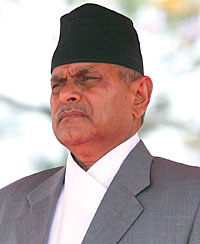 KIRAN PANDAY |
I begin with an incident. Alok Bohara, with whom I studied, now lives in the US and supports Kathmandu University. He wanted to see me, and I met him. The next day, a newspaper reported that the president had met a RAW agent named Alok Joshi. I did not complain, did not even clarify, as advised by my press advisor. There are things that are better not spoken of. However, the truth should come out, which is the responsibility of journalism.
The opposition accused me of capturing booths during the CA elections. When I was a minister, some papers reported that I went to the UK for treatment of AIDS. The press council for journalists should be what the medical council is to medical doctors and the Nepal Bar Association is to lawyers. One has to pass a standardised exam followed by nine months of training to join the security forces. Civil servants take a government exam. But journalists acquire a license without having to take any such test. The Nepal Press Council needs to think of some test for journalists. Even a driver needs to pass the trials, why not journalists?
The Interim Constitution has emphasised consensus, as did the election results. Press people should understand the Interim Constitution, the CPA and the Special Committee on PLA Integration are the guidelines for completing the peace process.
Reporters should write in the national interest. They should play the role of social coordinators. More articles should be written about national unity, integrity and ethnic harmony. Violence of any kind can never be overlooked. Journalists have been targets recently. There are high professional hazards but they are not supposed to keep quiet.
Our media seems superficial, they do not go deep into issues. I don't like to read about ethnic and regional issues. The press should pacify the situation instead of aggravating it. I wish there would be more write-ups in favour of the national interest that would help maintain regional harmony between the himal, hill and Tarai regions.
A reporter needs to understand the pros and cons of deciding on states based on ethnicities. My request to the press people is they should work hard. What is the use of medicine after death?


